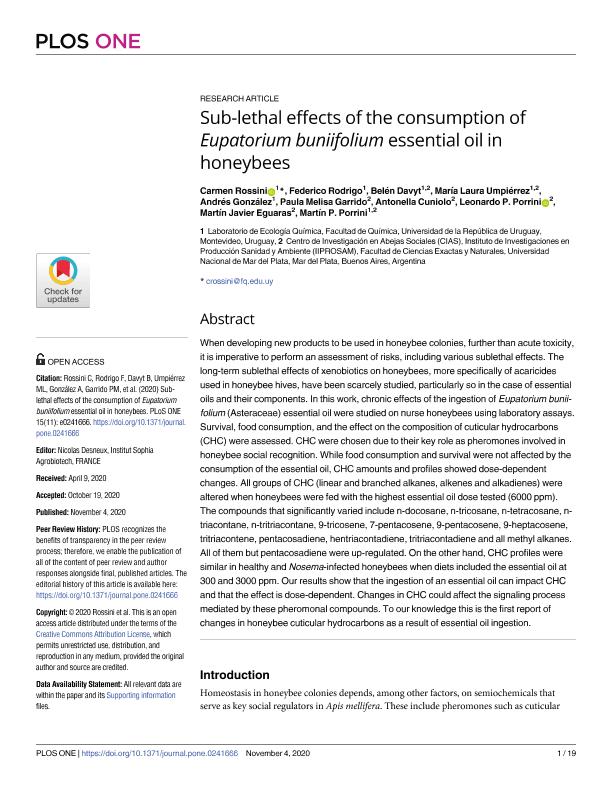Mostrar el registro sencillo del ítem
dc.contributor.author
Rossini, Carmen

dc.contributor.author
Rodrigo, Federico
dc.contributor.author
Davyt Colo, Belén

dc.contributor.author
Umpiérrez, Maria Laura
dc.contributor.author
González, Andrés
dc.contributor.author
Garrido, Paula Melisa

dc.contributor.author
Cuniolo, Antonella

dc.contributor.author
Porrini, Leonardo Pablo

dc.contributor.author
Eguaras, Martin Javier

dc.contributor.author
Porrini, Martín Pablo

dc.date.available
2022-06-06T12:49:14Z
dc.date.issued
2020-11
dc.identifier.citation
Rossini, Carmen; Rodrigo, Federico; Davyt Colo, Belén; Umpiérrez, Maria Laura; González, Andrés; et al.; Sub-lethal effects of the consumption of Eupatorium buniifolium essential oil in honeybees; Public Library of Science; Plos One; 15; 11; 11-2020; 1-19
dc.identifier.issn
1932-6203
dc.identifier.uri
http://hdl.handle.net/11336/158986
dc.description.abstract
When developing new products to be used in honeybee colonies, further than acute toxicity,it is imperative to perform an assessment of risks, including various sublethal effects. Thelong-term sublethal effects of xenobiotics on honeybees, more specifically of acaricidesused in honeybee hives, have been scarcely studied, particularly so in the case of essentialoils and their components. In this work, chronic effects of the ingestion of Eupatorium buniifolium(Asteraceae) essential oil were studied on nurse honeybees using laboratory assays.Survival, food consumption, and the effect on the composition of cuticular hydrocarbons(CHC) were assessed. CHC were chosen due to their key role as pheromones involved inhoneybee social recognition. While food consumption and survival were not affected by theconsumption of the essential oil, CHC amounts and profiles showed dose-dependentchanges. All groups of CHC (linear and branched alkanes, alkenes and alkadienes) werealtered when honeybees were fed with the highest essential oil dose tested (6000 ppm).The compounds that significantly varied include n-docosane, n-tricosane, n-tetracosane, ntriacontane,n-tritriacontane, 9-tricosene, 7-pentacosene, 9-pentacosene, 9-heptacosene,tritriacontene, pentacosadiene, hentriacontadiene, tritriacontadiene and all methyl alkanes.All of them but pentacosadiene were up-regulated. On the other hand, CHC profiles weresimilar in healthy and Nosema-infected honeybees when diets included the essential oil at300 and 3000 ppm. Our results show that the ingestion of an essential oil can impact CHCand that the effect is dose-dependent. Changes in CHC could affect the signaling processmediated by these pheromonal compounds. To our knowledge this is the first report ofchanges in honeybee cuticular hydrocarbons as a result of essential oil ingestion.
dc.format
application/pdf
dc.language.iso
eng
dc.publisher
Public Library of Science

dc.rights
info:eu-repo/semantics/openAccess
dc.rights.uri
https://creativecommons.org/licenses/by-nc-sa/2.5/ar/
dc.subject
APIS MELLIFERA
dc.subject
ESSENTIAL OILS
dc.subject
TOXICITY
dc.subject
SEMIOCHEMICALS
dc.subject.classification
Otras Ciencias Veterinarias

dc.subject.classification
Ciencias Veterinarias

dc.subject.classification
CIENCIAS AGRÍCOLAS

dc.title
Sub-lethal effects of the consumption of Eupatorium buniifolium essential oil in honeybees
dc.type
info:eu-repo/semantics/article
dc.type
info:ar-repo/semantics/artículo
dc.type
info:eu-repo/semantics/publishedVersion
dc.date.updated
2022-03-14T21:09:05Z
dc.journal.volume
15
dc.journal.number
11
dc.journal.pagination
1-19
dc.journal.pais
Estados Unidos

dc.description.fil
Fil: Rossini, Carmen. Universidad de la República; Uruguay
dc.description.fil
Fil: Rodrigo, Federico. Universidad de la República; Uruguay
dc.description.fil
Fil: Davyt Colo, Belén. Universidad Nacional de Mar del Plata. Instituto de Investigaciones en Producción, Sanidad y Ambiente - Consejo Nacional de Investigaciones Científicas y Técnicas. Centro Científico Tecnológico Conicet - Mar del Plata. Instituto de Investigaciones en Producción, Sanidad y Ambiente; Argentina
dc.description.fil
Fil: Umpiérrez, Maria Laura. Universidad Nacional de Mar del Plata. Instituto de Investigaciones en Producción, Sanidad y Ambiente - Consejo Nacional de Investigaciones Científicas y Técnicas. Centro Científico Tecnológico Conicet - Mar del Plata. Instituto de Investigaciones en Producción, Sanidad y Ambiente; Argentina
dc.description.fil
Fil: González, Andrés. Universidad de la República; Uruguay
dc.description.fil
Fil: Garrido, Paula Melisa. Universidad Nacional de Mar del Plata. Instituto de Investigaciones en Producción, Sanidad y Ambiente - Consejo Nacional de Investigaciones Científicas y Técnicas. Centro Científico Tecnológico Conicet - Mar del Plata. Instituto de Investigaciones en Producción, Sanidad y Ambiente; Argentina
dc.description.fil
Fil: Cuniolo, Antonella. Universidad Nacional de Mar del Plata. Instituto de Investigaciones en Producción, Sanidad y Ambiente - Consejo Nacional de Investigaciones Científicas y Técnicas. Centro Científico Tecnológico Conicet - Mar del Plata. Instituto de Investigaciones en Producción, Sanidad y Ambiente; Argentina
dc.description.fil
Fil: Porrini, Leonardo Pablo. Universidad Nacional de Mar del Plata. Instituto de Investigaciones en Producción, Sanidad y Ambiente - Consejo Nacional de Investigaciones Científicas y Técnicas. Centro Científico Tecnológico Conicet - Mar del Plata. Instituto de Investigaciones en Producción, Sanidad y Ambiente; Argentina
dc.description.fil
Fil: Eguaras, Martin Javier. Universidad Nacional de Mar del Plata. Instituto de Investigaciones en Producción, Sanidad y Ambiente - Consejo Nacional de Investigaciones Científicas y Técnicas. Centro Científico Tecnológico Conicet - Mar del Plata. Instituto de Investigaciones en Producción, Sanidad y Ambiente; Argentina
dc.description.fil
Fil: Porrini, Martín Pablo. Universidad Nacional de Mar del Plata. Instituto de Investigaciones en Producción, Sanidad y Ambiente - Consejo Nacional de Investigaciones Científicas y Técnicas. Centro Científico Tecnológico Conicet - Mar del Plata. Instituto de Investigaciones en Producción, Sanidad y Ambiente; Argentina
dc.journal.title
Plos One

dc.relation.alternativeid
info:eu-repo/semantics/altIdentifier/url/https://dx.plos.org/10.1371/journal.pone.0241666
dc.relation.alternativeid
info:eu-repo/semantics/altIdentifier/doi/http://dx.doi.org/10.1371/journal.pone.0241666
Archivos asociados
